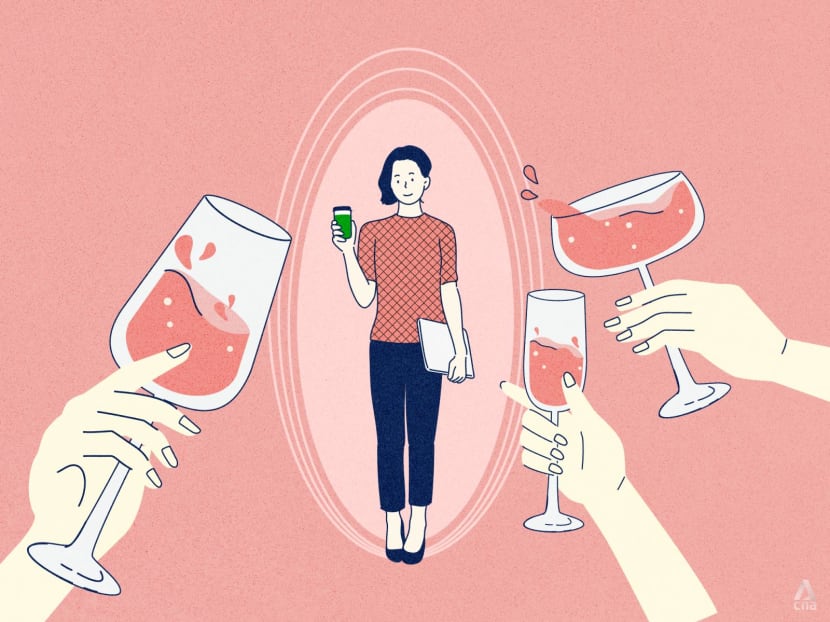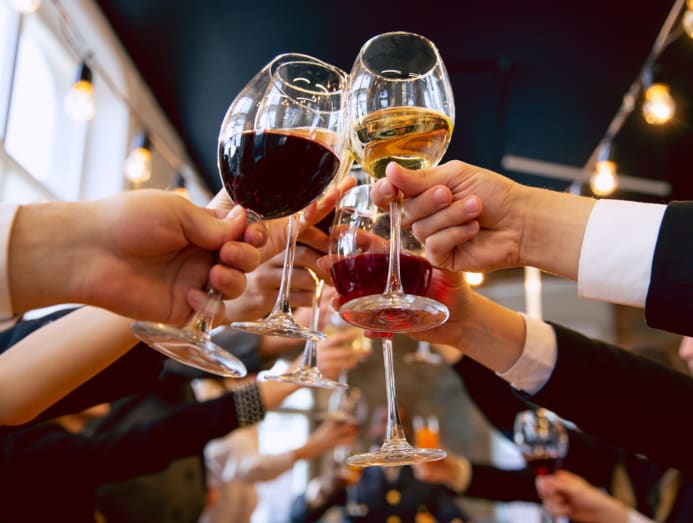Ways for non-drinkers to bond with clients and colleagues without alcohol
Refusing to drink alcohol at work-related gatherings can be awkward. Human resource professionals offer tips on how to hold your ground without seeming like a party pooper or a disinterested worker.

Overcoming social drinking expectations at work can be daunting for some non-drinkers, but it can be done with some charm and wit. (Illustration: CNA/Samuel Woo)

This audio is generated by an AI tool.
Adulthood is not just one phase of life but comes in stages. Its many facets can be overwhelming, from managing finances and buying a home to achieving work-life balance and maintaining healthy relationships. In this series, CNA TODAY's journalists help readers deal with the many challenges of being an adult and learn something themselves in the process.
As a teetotaller in an alcohol distribution company, Mr Ryan Choo often receives a raised eyebrow or two from clients when he chooses to drink water instead of whisky at their meetings.
“Some venue owners that I meet will give the advice that if I don’t drink, it might be a bit difficult to survive in the industry,” the 26-year-old senior executive said.
Even though he recognises that drinking is a big part of his industry’s culture and might help him break the ice when he first meets clients, he is confident that he can build a good rapport with them without the need to drink.
“I believe that it doesn’t affect how well I can work or how well I can add value to their business. At the end of the day, the work speaks for itself. A job is a job.”
While Mr Choo has stood firm on his choice, other employees like him who do not drink alcohol for whatever reason may not always feel so confident about abstaining from alcohol in a social setting.
Video producer Julia Aziz, 28, does not drink because it goes against her religion and she orders apple juice during social gatherings at work instead.
Although she has never faltered on her beliefs in this area, she has wondered whether her clients would have a better impression of her and she would be able to "connect" better with them if she did partake in social drinking at events.
Human resource (HR) experts told CNA TODAY said that certain industries such as sales, financial services, advertising and entertainment have more prominent drinking cultures because these businesses require clients to be entertained. And in other work settings, employers or employees view events with access to alcohol as an opportunity to bond with their colleagues or customers.
Mr David Blasco, country director at recruitment agency Randstad Singapore, said that it is common for non-drinkers to feel pressured to conform to the norm at get-togethers that involve alcohol.
“In companies where drinking is seen as a bonding ritual, there is a belief that choosing not to participate may give the perception that you are not truly committed to the job or business.”
So if you are a non-drinker, how do you respond to a workplace culture that encourages drinking alcohol and avoid feeling uncomfortable?
A TEETOTALLER IS NO LESS OF A WORKER
The HR professionals emphasised that there is no connection between work performance and social drinking.
Dr Tania Nagpaul, a senior lecturer of the human resources programme at the Singapore University of Social Sciences, said: “There is something fundamentally wrong if promotions and appraisals are dependent on social drinking.
"If employees are good at their work, they needn’t worry about fitting into the drinking culture.”
Mr Blasco reassured non-drinkers that it is unlikely that they will get ostracised based on their decision to not have any alcohol, as long as they are upfront about it.
Dr Nagpaul also said that drinking is not permissible during office hours in most companies anyway, so the majority of social drinking happens in the evenings.
She added that some business leaders do create an accepting environment for non-drinkers, dispelling the myth that there is no fun without drinking. The leaders do this by highlighting examples of workers who are the “life of the party” without taking a single sip of alcohol.
These bosses also call out biases or micro-aggressions towards non-drinkers, sending out a clear message that drinking is a choice and not a social norm or expected behaviour, Dr Nagpaul said.
This forces people to question their implicit belief of equating drinking with enjoyment and friendship.
“Bosses should lead by example by demonstrating a certain maturity and not losing sight of the fact that social drinking bears no connection to a person’s ability to enjoy a get-together and, importantly, their ability to perform well on their jobs.”
Assistant professor of organisational behaviour and human resources Jared Nai from Singapore Management University said that managers can be more cognisant of the concerns of non-drinkers and ensure that there are enough non-alcoholic options during events.
“(It also helps to have) open channels of feedback and objective appraisal standards such that non-drinkers do not feel penalised for not drinking or can raise their concerns with their supervisors,” Dr Nai advised.

USE HUMOUR TO DIFFUSE THE SITUATION
Employees should not be concerned that being a non-drinker will affect their chances of a promotion, but the experts said that skipping social events at work is not advisable because these are good opportunities to bond with colleagues and bosses.
To navigate such events as non-drinkers, Mr Blasco said that they should remind colleagues of the preference and ask that team members respect their personal choice.
To diffuse any tension that might arise, the experts gave a few suggestions for non-drinkers to establish healthy boundaries at workplace gatherings.
One strategy is to hold your ground and simply refuse a drink when offered. Dr Nai said that you can give a straightforward but polite response that you do not enjoy the taste of alcohol, then choose a non-alcoholic beverage such as a glass of sparkling water.
If the pressure continues, a firmer response – for instance, “I’m happy to participate in the conversations and games, but I have a strict no-alcohol diet” – can reinforce your boundaries, Mr Blasco said.
Another method to counter the social pressure is to give excuses such as being allergic to alcohol, wanting to preserve athletic performance, or tell of medical reasons or religious restrictions, Dr Nagpaul proposed.
Needing to drive is also a valid response on such occasions.
Alternatively, using humour is a helpful strategy as well. Dr Nagpaul said that non-drinkers may make lighthearted jokes such as “I’m high on life!” or “My apple juice has the same colour as your whisky”.
Dr Nai also said that jokes may offer some relief. For example, telling the other party that they are interesting enough without you having to drink.
He recommended helping a co-worker order an extra drink at the bar to take control of the situation and give the conversation a break.
Clinical psychologist Cher Jing En from mental health clinic Intellect said that you may also redirect the conversation by asking co-workers what their go-to drink is or if they have been to the venue before.
If you feel increasingly uncomfortable as the event progresses, you may choose to call it a day and leave earlier.
Ultimately, there are other social events not centred around alcohol that serve the same purpose of boosting team cohesion, the experts said.
Dr Nagpaul said that building rapport in a team can be done through activities such as eating out or volunteering for community causes.
Mr Blasco said that sports or arts-based events are also alternatives for such purposes: “Activities like tufting (a modern type of yarn weaving), tea appreciation or a trip to a trampoline park provide the opportunity for everyone to take part in activities together.”
The bottom line is, the decision on what to do rests solely on you, Mr Cher from Intellect stressed.
He said that non-drinkers can evaluate whether attending social drinking events aligns with their personal and professional goals.
"If the gathering offers meaningful networking or team bonding opportunities, they might choose to attend without drinking.
"If it conflicts with their values or comfort level, they can opt out, while finding other ways to build workplace relationships," he added.



.jpg?itok=wNPcWw_x)
.jpg?itok=6I4ZtfyH)








